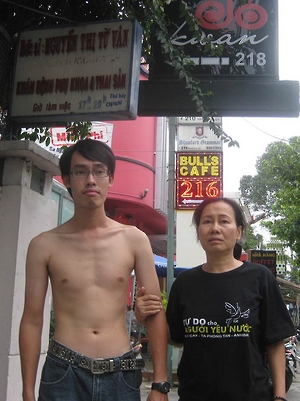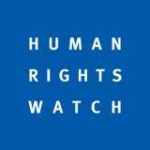April 10, 2013
Vietnam: Rights Dialogue Should Produce Concrete Steps

Police detained Nguyen Tri Dung and his mother to prevent them from attending the trial of three prominent bloggers, including his father Nguyen Van Hai on September 24, 2012. After the court sentenced the bloggers, police stripped Dung’s t-shirt which featured the slogan: Freedom for Patriots. © 2012 VRNs
 Time for Government to Begin Delivering on Human Rights
Time for Government to Begin Delivering on Human Rights
Vietnam is bidding for a seat on the UN Human Rights Council and will inevitably face greater scrutiny of its record at the Council’s Universal Periodic Review process.
Human Rights Watch pointed to the large and growing number of criminal convictions of peaceful protesters by Vietnam. In 2012, at least 40 people are known to have been convicted and sentenced to prison in trials that did not meet international due process and fair trials standards. Alarmingly, at least 40 more people were convicted in political trials in just the first six weeks of 2013.
“Last year was a terrible year for dissidents, who were imprisoned in large numbers,” Adams said. “Yet just as many activists were imprisoned after political trials in the first two months of 2013 than in the entire year of 2012. The Vietnamese government needs to realize it cannot solve the country’s huge social and political problems by throwing all its critics in jail.”
In recent months there has been an official campaign to suppress critical comments about the process of amending Vietnam’s constitution. This campaign appears to have been a factor in the arrest on December 27, 2012, of human rights-defending lawyer Le Quoc Quan and in official harassment and intimidation during February and March 2013 against critics like the journalist Nguyen Dac Kien, and Buddhist activist Le Cong Cau. Anonymous thugs threw rotten fish heads and fish intestines at the house of 2012 Hellman/Hammett prize winner, writer Huynh Ngoc Tuan. On April 8 and April 9, bloggers Bui Thi Minh Hang and Nguyen Chi Duc were attacked while police failed to intervene.
Vietnam has held some political prisoners for decades. In some instances these prisoners have been denied proper medical care for deteriorating health conditions. One of these is 66-year-old Nguyen Huu Cau, first detained in 1975, then rearrested in 1982 and held ever since. His health has reportedly deteriorated recently.
As a first urgent and humanitarian step, Human Rights Watch urged Vietnam to grant medical parole to all political prisoners and detainees who, like Nguyen Huu Cau, have serious health problems, followed by expeditious independent and impartial review of their cases to ascertain those who should be unconditionally and permanently released because they have been held solely for peaceful exercise of their fundamental human rights.
Those who appear to be in that category include:Nguyen Huu Cau,Tran Huynh Duy Thuc, Ho Duc Hoa,Dang Xuan Dieu, Le Van Son, Nguyen Van Hai, Mai Thi Dung, Nguyen Cong Chinh, Pham Thi Phuong,Ta Phong Tan,Nguyen Hoang Quoc Hung, Nguyen Van Ly,Nguyen Dang Minh Man, Tran Thi Thuy,Phung Lam, Do Thi Minh Hanh, Doan Huy Chuong, Cu Huy Ha Vu,Nguyen Tien Trung, Pham Van Thong, Nguyen Ngoc Cuong,Dinh Dang Dinh, Nguyen Xuan Nghia, Tran Vu Anh Binh, Nguyen Kim Nhan, Ho Thi Bich Khuong, Le Thanh Tung,Phan Ngoc Tuan, Vi Duc Hoi, Nguyen Van Lia, Vo Minh Tri, Le Quoc Quan – and many others.
Human Rights Watch called on the Vietnamese government to use the current process of amending the constitution to initiate an urgent program of legal reform aimed at:
- Amending or repealing legal provisions that effectively criminalize peaceful dissent, freedom of expression, and labor organizing;
- Removing all legal hindrances toindependent religious organizations to freely conduct peaceful religious activities;
- Dropping plans for implementing the current “Decree on the Management, Provision, and Use of Internet Services and Information on the Network” and removing filtering, surveillance, and other restrictions on internet usage;
- Abolishing all legal justifications for forced labor and detention without trial for so-called “labor therapy” in cases of drug use or other purposes; and
- Dropping all provisions that make possible land confiscation without due process, just compensation,and independent and impartial means of review.
“For far too long, Vietnam’s government has been given an easy ride on human rights, with the result that the Vietnamese people have suffered increasing abuses,” said Adams. “The roadmap to reform is obvious, but it requires the Vietnamese Communist Party to tolerate dissent and accept the right of people to advocate different views.
Source: http://www.hrw.org/news/2013/04/09/vietnam-rights-dialogue-should-produce-concrete-steps
[subscribe2]






October 17, 2013 @ 2:41 AM
I’m truly enjoying the design and layout of your blog.
It’s a very easy on the eyes which makes it much more enjoyable for me to come here and visit
more often. Did you hire out a developer to create your theme?
Superb work!
October 20, 2013 @ 6:43 AM
I’m gone to convey my little brother, that he should also go to
see this website on regular basis to get updated from most up-to-date reports.
October 21, 2013 @ 2:57 PM
It’s a shame you don’t have a donate button! I’d definitely donate to this fantastic blog!
I suppose for now i’ll settle for book-marking and adding your RSS feed to my Google account.
I look forward to fresh updates and will share this website with my Facebook group.
Talk soon!
October 21, 2013 @ 7:20 PM
I’m really impressed with your writing skills as well as with the layout on your weblog.
Is this a paid theme or did you customize it yourself?
Either way keep up the excellent quality writing,
it’s rare to see a nice blog like this one these days.